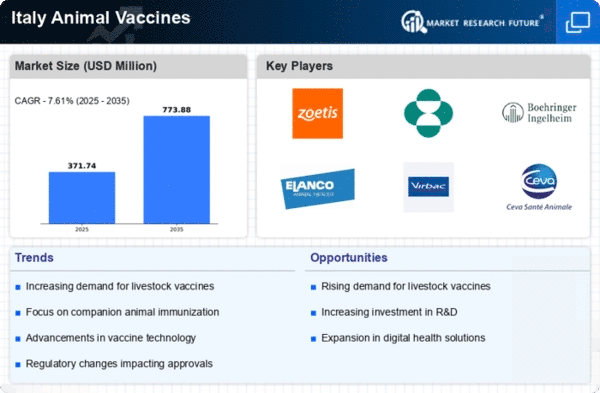Emerging Zoonotic Diseases
The rise of zoonotic diseases poses a significant challenge to public health and animal welfare in Italy, thereby influencing the animal vaccines market. Recent reports indicate that zoonotic diseases account for nearly 60% of all infectious diseases affecting humans. This alarming statistic has prompted the Italian government to prioritize vaccination programs for both domestic and wild animals. The animal vaccines market is likely to see increased demand as authorities implement measures to control these diseases through vaccination. The focus on preventing zoonotic transmission underscores the critical role of vaccines in safeguarding both animal and human health, potentially leading to a surge in vaccine research and development.
Increasing Livestock Production
The demand for animal vaccines market in Italy is closely linked to the growth in livestock production. As the country aims to enhance its agricultural output, the need for effective vaccination programs becomes paramount. In 2023, Italy reported a livestock population of approximately 10 million cattle and 15 million pigs, necessitating robust vaccination strategies to prevent disease outbreaks. The animal vaccines market is expected to expand as farmers increasingly recognize the economic benefits of vaccination in maintaining herd health and productivity. This trend is likely to drive investments in vaccine development and distribution, ensuring that livestock remains healthy and productive, thereby supporting the overall agricultural economy.
Government Initiatives and Funding
Government initiatives play a crucial role in shaping the animal vaccines market in Italy. The Italian Ministry of Health has launched various programs aimed at improving animal health through vaccination. In recent years, funding for veterinary services has increased by approximately 15%, facilitating the development and distribution of vaccines. These initiatives not only support the animal vaccines market but also promote public health by controlling animal diseases. The collaboration between government bodies and private sectors is likely to enhance vaccine accessibility and affordability, further stimulating market growth. As such, government support remains a vital driver for the advancement of vaccination strategies in Italy.
Consumer Demand for Safe Animal Products
Consumer preferences in Italy are shifting towards safe and healthy animal products, which directly impacts the animal vaccines market. With a growing awareness of food safety, consumers are increasingly concerned about the health of livestock and the quality of animal-derived products. In 2023, surveys indicated that over 70% of Italian consumers prioritize animal welfare and health when purchasing meat and dairy products. This trend is likely to drive farmers to adopt comprehensive vaccination programs to ensure the health of their animals, thereby enhancing product safety. Consequently, the animal vaccines market may experience growth as producers seek to meet consumer expectations and regulatory standards.
Technological Innovations in Vaccine Delivery
Technological innovations are transforming the animal vaccines market in Italy, particularly in vaccine delivery methods. Advances in biotechnology and immunology have led to the development of more effective and easier-to-administer vaccines. For instance, the introduction of needle-free delivery systems has shown promise in improving vaccination rates among livestock. In 2023, it was estimated that these innovations could increase vaccination efficiency by up to 30%. As farmers and veterinarians adopt these new technologies, the animal vaccines market is likely to benefit from enhanced efficacy and reduced costs associated with traditional vaccination methods. This trend suggests a potential shift towards more innovative solutions in animal health management.




















Leave a Comment